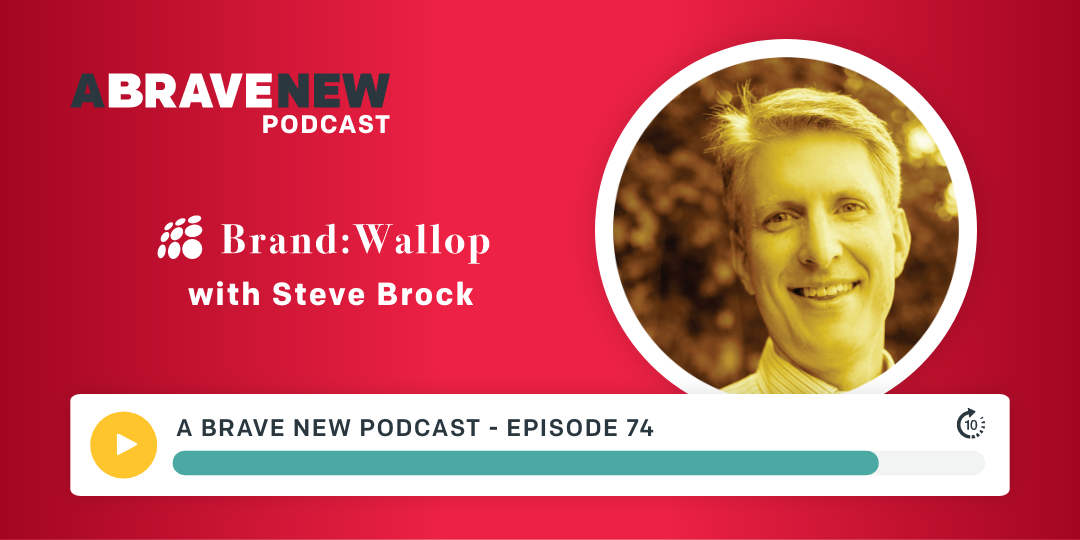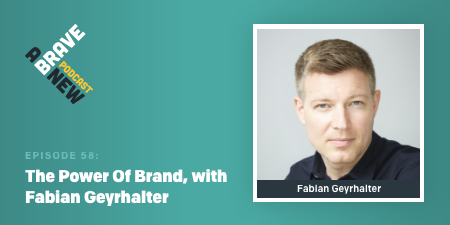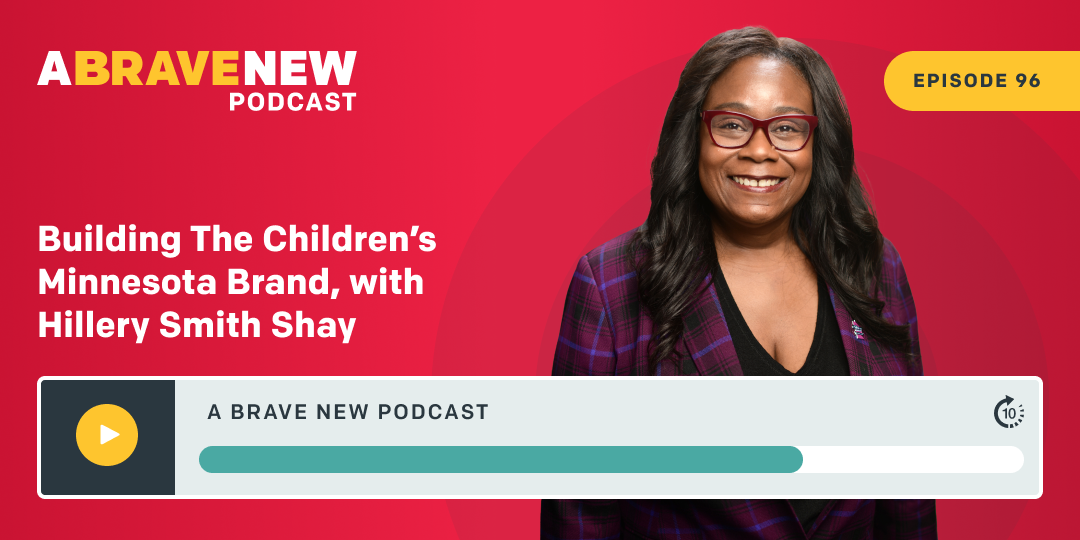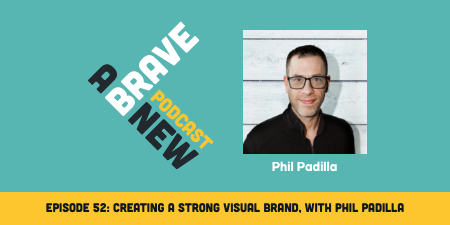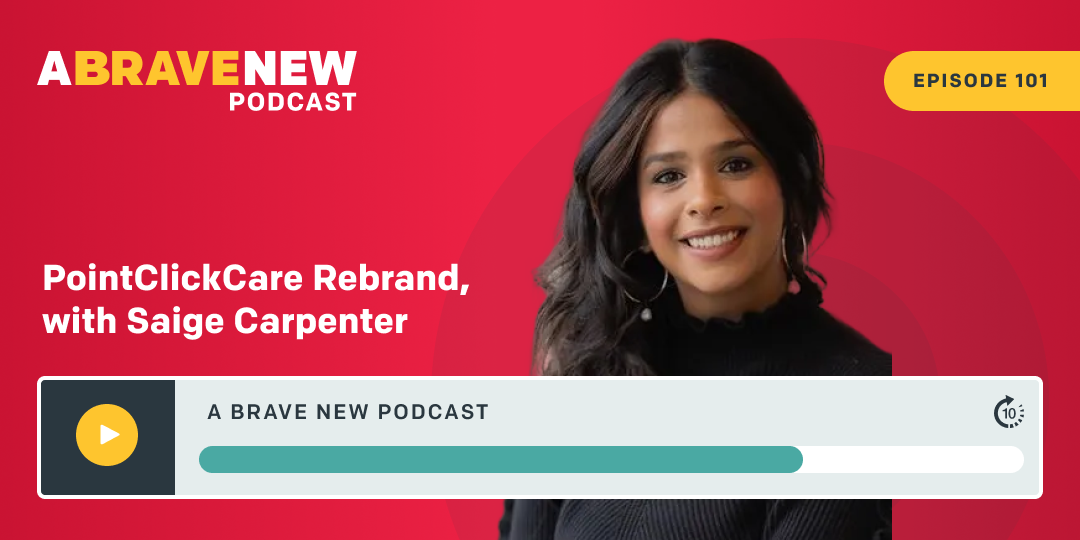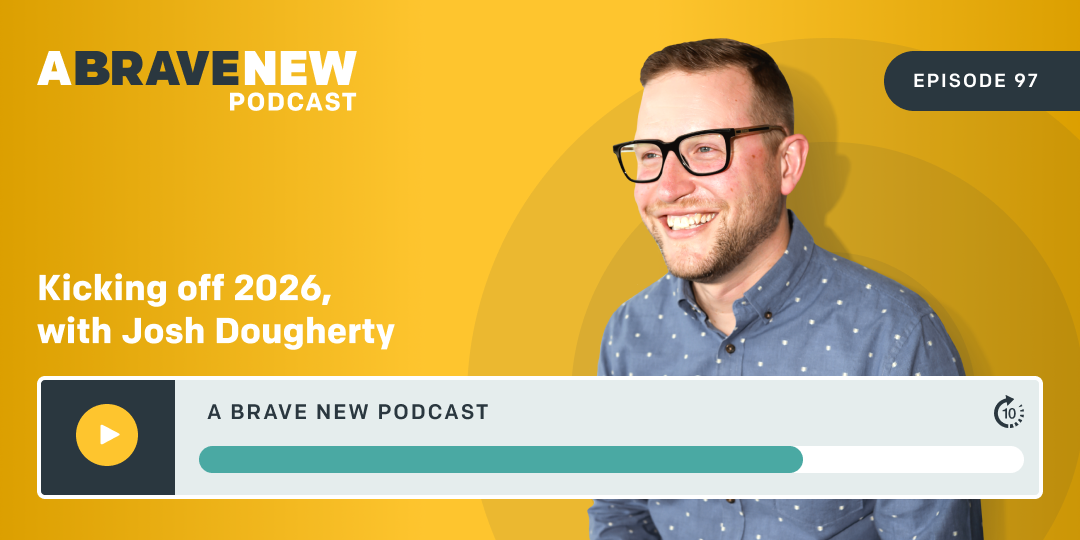Josh Dougherty is a brand strategist, speaker, and the founder and CEO of A Brave New, a Seattle-based B2B digital marketing agency specializing in tech and healthcare. Over the last decade plus, he’s worked with clients to develop unique brands and accelerate business growth using web design, inbound marketing, account-based marketing strategies.
What you’ll learn about in this episode:
A company is only as important as the memory it leaves in its customer’s minds. In this episode Josh will explore:
- Why branding is important
- Why entrepreneurs and founders should focus on branding
- The connection between branding and memory
- 3 Questions to ask as start working on your brand
- How great brands align teams to work more effectively, redefines how people think about a category or product, and free companies from price competition
Additional Resources:
- Free Guide: The secret to an accelerated branding process
- An Introduction To Integrated Branding
- A Brave New’s Website
Show Transcription:
Intro: Welcome to a Brave New Podcast, the podcast all about how big ideas, brave thinking and marketing smarts, help businesses grow. Here is your host, Josh Dougherty.
Josh: Hello, and welcome to a Brave New Podcast. I'm Josh Dougherty, your host, and I'm so glad to have you with me today. Today, we're going to spend some time talking about one of the most important concepts that marketers need to focus on in 2022 and that's brand. In fact I would really go a step further and for the companies that we work with in the healthcare and tech sectors, I would say this is the most important thing. Here's why. As marketing tactics continue to change, technology advances, third party data becomes harder than ever to leverage, the value of a unique and memorable brand becomes more important than ever. In fact, we often tell our clients two things when we're talking about this. First, I say really that your company is only as important as the memory it leaves in your customer's minds.
And then the second thing I tell people is that discovering what makes that memory unique and really curating it, is the best way to safeguard the future of your company. Now, I understand as you're listening you may think, Josh, that's a pretty big claim to make, but there claims that I believe are true at my core. And it's really not just about beliefs, it's something that's been born out time and time again in the marketplace with the clients that we've worked with and just with what you see think day to day in the technology and healthcare industries. And I want to encourage you if you're a founder or an entrepreneur or someone who's in strategic leadership in an organization to really focus in and think about these concepts, because really they're the most important things to focus on. So today I'm going to share some stories, I'm going to talk through my experience over the last decade doing branding work and hopefully inspire you to invest in your brand.
And as with most things, I think some stories are the best way to explain this. So I'm going to dive into it one from my time in college, which was a few too many years ago. Wish it was a little closer, right? And then we'll go from there. So I remember this freshman English class I have. And as I walk into that freshman English class, I see a chair on top of my teacher's desk. I look around and I see that pretty much all the students were looking around confused. And 10 minutes later, our six year old professor hopped on top of the desk and he jumps into the chair. He begins to read. His bushy mustache bounces up and down along with the pros and tears begin to well up in his eyes. And he, at that moment, had really captured the attention that all of us students had.
We can't take our eyes away from him. We can't stop listening and we can't stop reading. Now this was a class about the The Iliad and he had made it come alive to a bunch of college freshmen. And now all these years later, few too many years later, I still remember that moment that Dr. Reinsma really captivated me, and I couldn't get enough of that class when I was in it. He drew me into the drama like it was happening in a movie screen right in front of me. And I can still picture the classroom all these years later and I can still hear his voice. Now stick with me here, I'll get to why this is about brands. But first I'm going to talk a little more about Dr. Reinsma. He was a really a brilliant professor, but I had a lot of brilliant profs in college. Right? So did you, probably.
So, the question I have as I think about him is why do I still remember him so clearly? And the reason I do is because Dr. Reinsma was unique. He had a passionate approach. It wasn't an act, it was at the core of who he was. It was real, it was authentic, and every student really loved him. He left such a lasting imprint in my mind that 20 years later, if I could go back to school and register for that class again, I would. And the reason I tell this story when I start talking about brand, is that Dr. Reinsma is a great example of the power and importance of memory. See, memory is transformative and it's something each and every one of us need to be thinking about for the companies we represent and lead. And here's why. Back to what I said at the top, at the end of the day, a company is only as important as the memory it leaves in its customer's minds.
So let that sit with you for a minute and percolate. Your company is only as important as the memory it leaves in your customer minds. Just like Dr. Reinsma and what he did and how he went about his business made studying the The Iliad, a long 700 page classic piece of literature, memorable. I can still tell the story, I still feel like I was there. On the same token, if the memory that you create for a company is unique, you can really rise above the crowd and solidify a position ahead of your competition. Your customers and your prospects will think of you first when they need help with a problem, or when they want to find a solution, if we want to be a little more positive. Now, if not, you're just another face in the crowd. And here's how that relates to branding.
That memory that I've been talking about, that you'd think that makes you unique, and we'll get into this a little bit more further in the podcast, but that really forms what we call the essence of your brand. And your brand exists in the mind of your customer, not in your slogan, your logo, or even the company experience, although really all of these things can help to form that memory. So I want to think now a little bit about great brands like Disney and Harley Davidson. You thinking about them, these are pretty memory ones, right? Classic examples, I think a brand. But Disney conjures up memories of magical stories that really mesmerized me as a child. I think about all the different movies that I would watch time spent. And even though I'm not a kid anymore, it still makes me feel a certain way. It still makes me picture myself in front of the TV watching that movie or showing up in Disneyland that first time. Harley Davidson, if you're a motorcycle rider, or if you aren't, which I am not, it really inspires memories of freedom in the open road.
And the funny thing about this is that Harley Davidson riders, owners, I should say, here I'm showing that I do don't ride a motorcycle the way I'm talking about it, but they only ride a motorcycle like 80 miles a year on average, but they sure feel free when they're using their Harley. And the whole lesson here is really, it's the memory that matters. And great companies have gone to great lengths to make sure that memory is really clear and unique. And that's why one of the reasons I say, that if you're a leader, if you're an entrepreneur, a founder, a CEO, a strategic leader in your organization, this is the most important work that you can be doing. Because when you build that unique memory and you build it effectively, you are going to supercharge everything else you're doing because you don't have to do the work of getting noticed or making people fall in love with you, they already love you. They've already noticed you. And then when you're asking them if you can help them, or you're offering your services to them, or you're selling a product to them, they trust you already. There's a built-in association, a built-in memory that you've curated, which is what brand is all about.
So, another story will do another good job of illustrating this. I travel a lot for work or I should say, I did travel before the pandemic, right,. A lot for work. I'm getting back on the road now and with clients all over the country that's just part of doing business, right? We're all kind of used to it. And I've really done my own fair share of evenings flights. But most of them, most of these flights, they're just a blur. There's one trip that stands out to me though and I want to dig into that a little bit with you and share a little bit more about why this is valuable from a brand perspective. On this particular night, I was going through the motions at the airport, and you probably, if you travel, you know this on autopilot feeling, right? I can pretty much navigate from my car through clear and TSA pre-check and to my gate, plus a stop at the coffee shop without really thinking. And it's hard to overstate how much I just glide along. I only really realize that I'm traveling when someone slows me down. And this is maybe to the chagrin of my wife, when I'm pushing her through the airport when we're going vacation, I have to switch something off. And this night that I'm thinking of was really no different.
I parked, I put my bags through security, I grabbed my coffee and headed to the gate. Now, if you're in Seattle, I recommend for coffee shop recommendation, hitting up the Caffe Vita in the C Concourse at SeaTac. It's totally worth it. It's worth a stop every time. If not, you'll have to make a trip to Seattle and then stop there. So pick up my gate, pick up my coffee, I head to the gate, and as I board, I slip into my seat on the plane, I put on my Bose headphones and I prepare to really isolate myself with a good book and some music until I land in Denver. It's typically how I like to fly. I bet you've done this too, right? Be honest. I've likely seen you. We're all boarding together, right? We're enjoying our elite status, we're smug about getting on first and then hurrying to make sure we don't have to talk to anyone. And then you curl up just like a cat, pretend there's no one else on board as the steel tube you're in hurdles through the sky. It's a familiar, right? You can picture it.
Now that was my plan that night as well until I was interrupted. And about halfway to Denver, the flight attendant came to my chair and dropped off a placard and a chocolate announcing that the Alaska Airlines acquisition of Virgin America, you may remember this, the design of this placard was crisp and this was a big placard, it was like 9 by 12. The chocolate was a nice touch and it was delivered with kind of that typical understated good service you can expect from Alaska, which I think is the best airline in the United States. And I remember thinking that announcing the acquisition mid-flight was a pretty cool touch, but then I went back to my book, kept reading.
Then when we got to the gate that night, I walked off and I was greeted by a whole set of new signage announcing the acquisition and the benefits it would bring to elite travelers like me. And I don't know how many other flyers had a similar experience that day, and it doesn't really matter. Alaska Airlines managed to make a significant impact on my perception of them, and I still remember it, I think three to five years later, it's been a while. And this was only a three hour flight from Seattle to Denver. And this again goes to my point. A company is only as important as the memory it leaves in its customer's minds. So you may be thinking as I'm talking, come on Josh, airlines merge all the time. What's interesting about chocolate and a placard? Or maybe, you may be jealous, which you may be thinking, damn I wish I got that when I flew on United. Either way, I hope you'll also spend your skepticism.
So, let's come back to this flight and kind of think about it. So it's a Wednesday night, I think. And let's imagine that what a different version of the experience could have felt like. In this version of reality, I board the plane, I slip on my headphones, I doze through the safety briefing and for a couple hours I'm engrossed in my book. And then I deplane, grab my rental car, and check in at another non-descript business hotel ahead of my meeting the next morning. Meanwhile, the airline has huge news, right? They wanted to get out to everyone so they decide to do the most corporate thing ever, they issue a press release. They also write a blog and send an email that they hope 20% of the elite travelers will open, and probably a significantly smaller number will read. And then they go on with business as usual.
So, can you tell the difference? Sure. Alaska did all the basics as well, press release, blog post, emails, but if they had stopped there, they would've left out all the magical moments, the ones that you remember, the ones that I'm still talking about years later. And these are the things that matter because at the end of the day, the company is only as important as the memory it leaves in its customer's minds. And I think this is the thing that's so hard for many of us to grasp. It doesn't matter what your customer says when they're talking to you, I've had so many business calls when it seems to be going really well, but then maybe I haven't left a distinct enough memory and I'm chasing that business days later and trying to get people to make a purchase unsuccessfully. It happens in business. It doesn't matter how intently they listen to you during a presentation, and I would say and argue with you, it doesn't even matter whether you close the deal.
Now it's going to matter for short term revenue. It's going to matter for maybe your short term success, if those things go well. But for the long term security of your brand, the only thing that really matters is the memory that someone has of you after they've stopped interacting with you, because it's the only thing that sets you apart from a sea of competitors that's getting more saturated every day. We talk about this a lot as a marketing agency because there are thousands of marketing agencies to choose from. So what makes someone choose a brave new instead of someone else? It's all about that memory we're cultivating, otherwise we have nothing. And this is why when I talk to people about branding and when we get into discussions with my friends who care about this, whether you're an entrepreneur or a founder or an executive, we admit that really we're all in the memory business, the business of creating a memorable brand.
And I think that discovering that unique memory you want to create, and curate is probably a better word for it, is the best way to safeguard that future of your company. If you're a little skeptical of this still, I want you to imagine if I was telling a story about your company and an interaction I had with them years ago instead of Alaska Airlines. As an entrepreneur, I know that I would do almost anything for that and I think you would too. Okay, so what gives? Enough stories about the value of brand. If you're convinced that you need to curate a unique memory and to safeguard the future of your brand, I'd recommend you start out by asking yourself three questions. Question one, what memory do you want your company to leave in people's minds? Question two. This one's especially tailored towards those entrepreneurs. What do you want your legacy to be? And question three. How will you ensure that your company can continue to succeed when you're no longer involved in the day to day?
Let's dive into question one first. What memory do you want your company to leave in people's minds? Really your answer to this question will determine whether you stand out from your competition, or if you're just another member of the crowd. And let me give you a bit of a hint here or something to think about. If all someone can say about you is that you provide great customer service, that isn't unique or helpful. And I say this somewhat jokingly, but also with the realization that often we say people choose us because we have the best customer service, because we're responsive, because we're professional, all these things, but these aren't unique or helpful. These should be accepted things that have to happen no matter what.
So, what do I mean when I'm talking about that memory? Well, great category busting brands like Airbnb transformed the way we think about an experience. And then they build upon that distinctiveness in every single interaction. And that type of consistency matters, the building. In Airbnb's case, it means that I have a memorable story to tell when I explain to someone my love for the company, I find myself talking about them a lot actually, which is kind of funny. But I'll tell people, oh yeah, they're the company that makes it possible for me to go on vacation like I'm a local living at home. And then I'll delve into seriously. There was this little apartment and on Floor France, it was right above, and you get the idea. I can transport myself straight to France and tell about my experience there quickly. And it's inextricably linked to Airbnb.
This is the type of memory we want to curate for our companies. Asking what memory you want your company to leave with your customers, especially important if you're a founder, because typically I think that memory will have something to do with what you uniquely bring to the table. That unique thing is the reason your customers trust you, it's also probably hiding in plain sight and it comes naturally to you so you don't even have to think about it. And spending some time thinking about this question and how to bottle it up, it will allow you to turn that memory into something powerful that can be reinforced every time someone interacts with your brand. And the power of writing down the answer of what memory you want your company to leave in people's minds is that you'll be able to capture, help your team capture what is that makes the company special and live out the magic because each of them needs to learn how to plant and grow the memory with their own unique take, but it needs all of the same components of when you're telling that story or when people are interacting with you. It's really the only option if you don't want your uniqueness to disappear as you control less and less of the day to day business. What memory do you want your company to leave in people's minds?
Now, question two. What do you want your legacy to be? Another great question for entrepreneurs, CEOs, founders of companies. Some people start building lead companies just for money, then that's fine. We all want to get paid, and I don't think there's any shame in that, but I think people are doing that only for the money are in the minority and there's really a powerful fire burning inside of most entrepreneurs. We yearn for something a bit deeper. We're trying to create something meaningful, a legacy. Otherwise, what reward will we get from the endless hours of toil? We may as well spend our time doing something else. What drives you? Think about that for a minute. Now think about your team. How many of them have that same deep drive that yearning, maybe you can count a few people, but the hard truth is that the majority of your team are working because they want to do a job. Sure, they want to work hard and they're incredibly talented, but not everyone has legacy in mind, let alone their company's legacy. And this is where things really get difficult I think often, because there's a big difference between doing great work and working in service of a legacy.
And as a leader you must make your legacy, the one you're trying to build, both accessible and motivating to everyone in the company, and everyone must be able to operate in service of that legacy otherwise your business will just become a profit driven machine. Which profit in itself isn't bad, but if that's all you're after you're going to, at some point optimize the special thing out of your company. The thing that really matters. So what do you want your legacy to be? That's the second question you answer. And now question three. How will you ensure your company can succeed when you're gone? This is the biggest challenge of all. Most of us entrepreneurs and leaders, we have some charisma, even if we're quiet, we have a way of charming the room, and most of us are good at keeping things running well and on mission when we're in and around the building. Keep in mind I'm talking about a really metaphorical building right now, because many of you may be having your teams work remote across some areas. Maybe that's coming to an end, you've probably gone into a hybrid arrangement.
But the biggest question of all will be, what will happen when you aren't in the room or when you have a bunch of buildings? Will your company continue to represent what makes you special, who you are and what you believe in when you're no longer there to obsess over every minute detail? Maybe this point will come when you're no longer actively involved in the business because you've moved on to the next project. Maybe it will happen when you've retired. Maybe it will just happened when your company's gotten so large that you can no longer control every aspect of it. Regardless, the bottom line is this, it will happen, and unless you've spent time building your DNA into the DNA of the organization, then what makes you special will disappear as you're less involved. So that's why the third important question is, again, to ask and answer, how will you ensure your company can continue to succeed when you're gone?
Now let's go over those three questions again, just for sake since I've been talking about each of them for a while. Question one is, what memory do you want your company to leave in people's minds? Question two is, what legacy or what do you want your legacy to be? Question three is, how will you ensure your company can continue to succeed when you're gone? And these questions are no doubt difficult to answer, but they lay plain the only thing I really want you to remember at the end of this podcast, which is at the end of the day, a company is only as important as the memory it leaves in its customers minds. Starting to remember it, I've mentioned it once or twice, and really discovering what makes that memory unique and curating it is the best way to safeguard the future of your company. And oftentimes that uniqueness is represented in you if you're the founder.
We usually don't realize what makes us unique because it comes natural to us. But until we admit this fact, it's impossible for our team to live out that uniqueness with us. If your company is your legacy, your legacy depends on replicating the thing that makes you special and that allowed you to grow the company from day one. So the bottom line is you really need a brand, but make sure you don't get too caught up in technical branding terms. All we're talking about here is the memory we talked about before. In branding terms we call this an essence, and this essence should be a short phrase that explains a unique way you approach your business. Once you've identified it, you need to reverse engineer it into every aspect of the company.
And I think at this point, oftentimes when I'm talking about branding with someone or when people are starting to seriously consider it, they see $100 bills just going out of their wallet. And I don't want you to do that necessarily. Certainly I think there's a place for professional branding exercise to really get stuff done. We obviously offer that as an organization, and it doesn't have to be too high concept here. I really want you to be intensely practical as you think about your brand, because in my experience, intensely practical brands are the ones that succeed. So if you're thinking about that essence and you're thinking about, okay, we get the essence down, we know that this is the kernel or the key thing that we're trying to people to understand, now it's time to think about if the essence is going to safeguard my future, how does it do that? How does it safeguard Harley Davidson's future to have the essence of freedom? These are good questions.
So it's three primary ways that this works. The first is by providing alignment. A good essence provides alignment around how we want to experience it. A good brand essence also redefines our category and also allows us to never compete on price again. So let's dive into each of them. Again, we're going to do a little bit of story time because I think that's the best way to explain some of this stuff. And so first I'm going to dive into one of my amateur hobbies that I've pursued over the years, which is long-distance cycling. And the reason I love cycling is because there's really nothing like riding down a country road on a Saturday morning. The songs the birds are singing, the smell of fresh cut grass, the hum of bicycle tires against the road, it's really perfect and magical. And in cycling, there's this thing called the pace line. Maybe you've seen it if you turn on the Tour de France.
In a pace line, a whole group of riders works together as a unit. They're riding in a straight line with their wheels within inches of each other. The rider at the front of the line breaks down the resistance, while those riding behind have less work to do. Every few minutes, you switch the leader. And this is all about aerodynamics. Now the rider's leading the pace line on a professional team are called domestiques, which is the French word for servant. And there's a reason for this. It's really grueling work and collectively riding like this can elevate the average speed you're able to travel as a group sometimes by as much as five to 10 miles per hour, even for a mere amateur like me.
But there's one thing that I really have discovered, and you probably have if you've ridden in a pace sign before. You have to get really close to the person in front of you. I mean, I'm talking like three to six inches while you're hurdling down the road at 15, 20, 30 miles an hour. And there's another thing. All of this depends on coordination. If you ride too fast, you'll clip the tire of the rider in front of you starting a chain reaction that'll wipe out however long the pace line is. But if you ride too slow and let two to three feet get between you and the next rider, you've broken the pace line and you now no longer benefit from the collective strength of the team. Everything here depends on alignment and precision. Alignment and working towards the same shared common goal, and precision in working towards the common goal in the same way.
And the same is true at your company. Here's how it comes around a branding. If you would get 10 different answers from 10 different employees to the question who are we and what makes us unique, you have an alignment problem and really narrowing down on that essence brings alignment around that unique thing that makes your company so special and it allows you to all ride together in the same direction. And not only that, at the same speed, and allows you to get further together. Think about Harley Davidson again here. By knowing that everything they're doing is about freedom, they can all be aligned around the type of experience they want to create every time they're making a decision, but alignment isn't really the only thing that a brand gives you. Years ago, my wife and I spent an amazing final night in San Sebastián Spain. I maybe had a little too much drink. And when we go back to our room, neither of us really slept. I spent my evening really restlessly rolling around, probably snoring, and then waking up at 4:00 AM with that feeling, that dry mouth that you start to get when the alcohol starts wearing off, I feel like I have never had a drink of water in my life.
Meanwhile, I somehow hadn't noticed there's thunder crashing all around us. It makes the walls of our hotel room flash. Light, dark, light, dark. My wife really had noticed this though and that's why she didn't sleep. So in the morning we were exhausted, but we had to catch an 8:00 am train. So both of us get up blurry eyed, we're dragging ourselves through the hotel, we're headed to the train station ,it's hard to pull our luggage with us. And if you've ever been on a train in Spain you know most of them aren't really that efficient or fast. So we sit on the slow train to Barcelona, five hours from San Sebastian, and we arrive exhausted. When you haven't gotten much sleep, traveling through a city, lugging your bags, even if you only have a couple, it's hard work. And you're just thinking about when do I get to sit down and relax and exhale.
But at least when we got to Barcelona we weren't going to stay at a hotel, we got to our apartment on Ramblas de Catalunya, a lovely street. If you've ever been to Spain and to Barcelona, I should say Catalunya probably, someone from there would be correcting me. We rang the doorbell at the place we were staying, and Rod, our host, greets us with a hug and invites us in. So obviously a little bit before the COVID times we're just out of. And then he walked us upstairs to the studio apartment where we'd be staying. It was right next to his dressmaking shop. He was an amazing dress maker. And as he let us into the apartment, he showed us the bed, the bathroom, the kitchen, and most essentially that espresso machine, something I really needed at that moment because of my sheer tiredness. Before he ducked out to get back to work, he told us to let him know if we needed anything. And as we sat down on the couch, after he had left, exhausted, we did finally exhale. We relaxed, we let go. And it felt like we were at home, but we weren't in our home. We were in an Airbnb, another company I mentioned earlier, and this experience with Airbnb, coming home when we weren't at home, is the essence of what a great brand does.
And it's the essence of really what your company could do as well. It challenges all of your great brands like this challenge all of your preconceived notions about a category. No longer do I, when I travel, have to stay in a stuffy one size fits all hotel or pay exorbitant amounts to get a unique hotel experience, I can rent a space that feels like me. And traveling really is, will never be the same because Airbnb redefined their category by doing this. The best way to safeguard your company's future is to really do the same. And so brand brings alignment, it allows you to redefine the rules of the game, but it also does something else important as well. And to talk about that, we're going to talk about grocery shopping. Why we're talking about grocery shopping, it's because I love it. It's one of my favorite things to do. And I usually shop at a little grocery store in Seattle called Ballard Market, you probably know it if you're from the neighborhood. And I love shopping there because it doesn't feel like a grocery store. Even as the city has begun to grow up around it, it continues to feel like a small town grocer that I can trust.
And maybe this is a little bit of the nostalgia that I have as the person who grew up in a 10,000-person town. And maybe this is just hanging on a little bit inside of me, which I'm fine with. But one of the things I love about Ballard Market is that they have each of their department leads of the store making decisions about what to stock. Now, this means that although you're going to be able to get most of the normal things and get them organic, like I prefer, there's always going to be a couple things that are different and interesting as well. The other thing I really love is their produce section. It is really a site to behold. I can go into any other store, Whole Foods, Kroger, doesn't matter, their selection pales in comparison. I mean, damn. Ballard Market's produce section is something.
And for someone like me, who looks forward to a Saturday grocery shopping, it's a bit of heaven. The whole store experience, the shopping experience. And if you know me, I may be a little prone type probably so I will admit that, but I will also say the heaven disappears as soon as I walk into the cleaning supplies aisle to get some bleach. Doesn't happen too often but every once in a while you need it for cleaning, right? This aisle paralyzes me. I stare at all those short stubby bottles with handles on their neck and I ponder for a second, and then I grab a bottle of Clorox because it feels familiar, even though it's twice as much at a normal store, in a Ballard Market, it might be four times as much of what they're charging down the street. If you listen to critics of Ballard Markets pricing. But do you see what happened there? I willfully grabbed the product that was twice as much, despite the fact that all chlorine bleaches are essentially the same, a water solution of sodium hypochlorite either 5.25% for regular strength or 6% sodium hypochlorite for extra strength. And why talk about bleach this way and why get into the percentages?
Well, bleach is really an object lesson in how branding allows you to charge a premium. It frees you from that tyranny of price competition. You've been doing that new business pitch or that product pitch where you are trying to drop your price to be able to be competitive. Would it be nice to be free from that? Branding allows you to do that. I will fully pay double the cost for my groceries, for the experience I'm seeking, regardless of the fact that 90% of those groceries could be bought at any other store minus the produce. I hold out that the produce at Ballard Market is objectively better, you can't get it somewhere else. And then there's the matter of bleach. In that already pricey store that I shop at, when I get to the cleaning aisle I willfully pay a price premium to get a brand named Clorox bleach even though I know it's objectively the same as any other brand. I mean, I really know it, I just told you about it, I've done the research and this is the power of branding.
These companies charge a price premium because of their brand, not their product. These companies can charge a price premium because of their brand, not their product. And as a result, they've safeguarded their future really. So I haven't gotten too much into the specifics of how to build a memorable brand, but I really wanted to spend today just sharing with you some of the power behind those memorable brands. And I want to challenge you as we're getting near the end of today's episode, to really ask yourself, what would you be able to give to be able to have alignment, to be able to redefine the rules of engagement for your business category, to be able to charge a premium for your services, whether you are selling the exact same thing to someone as everyone else in the market. I think the answer typically is a lot, most of us would give a lot to have this. It sounds a lot like the stability that so many of us seek for our businesses but so rarely achieve. It sounds like the future that's secure, but also interestingly unique.
And I think the next obvious question is this, what will it cost me to achieve this? And I'm not talking about dollars or cents here. I'm talking about the effort and energy that will be spent on first understanding what makes you unique and then re-engineering your uniqueness back into every part of your company. I won't lie, it's hard work, but the work is going to be worth it because at the end you'll know you've really safeguarded the future of your company. And I think the best way to start is really to dive in and start understanding a branding process. And that's probably a subject for another podcast, so we won't get into it now, but I encourage you, we'll put the link to this in the show notes, to check out a resource we have called, The Secret To An Accelerated Branding Process. Kind of walk through the steps that you would go through to start thinking about what makes your brand unique, how to grow it, how to identify that unique essence and how to live it out through the rest of your company.
So, I hope I've convinced you of the value of branding today and of the importance of really curating that unique memory for your company. I'd love to talk to you more about it if you're interested, and if you want to learn more about branding, you can definitely check out that resource I just mentioned under abravenew.com. And definitely take some time I think in a future episode to unpack the process or what that branding process should look like and how it works. But as I said, that's a topic for another day and that's all I have for our show today. So we'll talk next time and see you later.
Outro: Thanks for listening to this episode of A Brave New Podcast. Go to abravenew.com for more resources and advice. If you enjoyed this episode, show us some love by subscribing ,reading and reviewing A Brave New Podcast, wherever you listen to your podcasts.
Similar Articles
OCT 11, 2021

The Beginner’s Guide to Generating Inbound Leads
Marketing doesn’t have to be painfully intrusive, like getting yet another telemarketing call right when you sit down to dinner with your family.
OCT 11, 2021

The Beginner’s Guide to Generating Inbound Leads
Marketing doesn’t have to be painfully intrusive, like getting yet another telemarketing call right when you sit down to dinner with your family.


